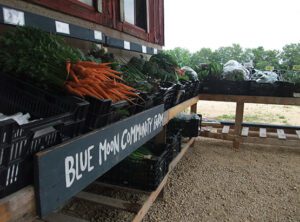Kristen Kordet was working as a restaurant server when she founded a Community Supported Agriculture (CSA) farm in 2004. Since then, Kordet’s Blue Moon Community Farm has supplied that restaurant, L’Etoile, with the seasonal vegetables left over after filling CSA members’ share boxes.
L’Etoile, established in Madison, Wisconsin in 1976, is a fine-dining meets farm-to-table establishment, among the first in the Midwest to consciously build its menu around local, seasonal food. French for star, L’Etoile remains a beacon for sustainably oriented restaurants. This model is cropping up more as consumers seek a clear connection to their food, the farmers who grow it, and the land it’s cultivated on.
The term “community supported agriculture” was coined in the northeastern U.S. in the 1980s. According to the USDA, there are about 13,000 CSAs in the U.S. CSA farmers typically sell shares in their operation to members who receive a box of vegetables every week. It’s like a subscription to produce. The contents of those CSA boxes depend on the time of year and other growing conditions. CSA farmers often peddle extra produce at local farmers markets and farm stands.
For years, Midwestern BioAg has serviced CSA growers and helped them grow great-tasting produce.
As farmers, we fundamentally believe getting the soil as healthy as you can is going to create healthy vegetables and healthy people.
The short CSA supply chain inspires loyalty from customers of farm-to-table restaurants like L’Etoile, said Kordet, a Midwestern BioAg customer who farms in nearby Stoughton.
“Most of the time, the person who grew that food is the one that’s delivering it to the restaurant. It’s special and increasingly rare. That food has a story,” Kordet said.
That story begins with CSA farmers producing diversified and often heirloom-variety crops with an attitude of land stewardship. Chefs at trendy restaurants are helping tell their stories through menu items that change with the supplies and the seasons for diners seeking local, organic foods.
Lettuces are Greg Simmons’ specialty at Marigold Hill Organics, a Midwestern BioAg customer from Grayslake, Illinois. There, he grows the baby kale, arugula, escarole, and radicchio that make top chefs swoon. The farm sets up a stall at Chicago’s Green City Market, which caters specifically to chefs on Wednesdays.
“There’s an extremely vibrant community of chefs and restaurants at the top of the dining world in Chicago that support local farmers and beautifully grown vegetables,” he said.
Marigold Hill Organics counts the One-Off Hospitality Group among its frequent customers. The group’s proprietor was named Outstanding Chef in 2013 by the prestigious James Beard Foundation, a nationally known culinary group. Simmons’ greens are served in Chicago restaurants including Blackbird, avec, and The Publican.
“These [chefs and restaurateurs] understand that they have to pay a little more to get the right product,” Simmons said. “It’s a little harder to grow organically. We baby this stuff. It’s nutrient-rich, fresh, and beautiful, and they understand that it costs a local farmer a little more to do it.”
CSA farmers use different methods to reach chefs who integrate their produce into unique dishes.
When John Binkley has veggies to spare from his CSA farm, he contacts chefs at downtown Madison restaurants like L’Etoile, whose chef was named Best Chef in the Midwest in 2013 by the James Beard Foundation, its sister restaurant Graze, and Pig in a Fur Coat, home to another James Beard Foundation-recognized chef.
“Every Sunday, I’ll send an email out to my chefs and tell them what I have and they’ll email back and say what they want,” Binkley said. In a few days, he delivers from Equinox Farm in nearby Waunakee.
“One of the things we move more volume of is tomatoes,” said Binkley, whose farm boasts 25 to 30 heirloom varieties.
Allison Parker’s Radical Root Organic Farm in Libertyville, Illinois is also a BioAg customer. She branched out in recent years from CSAs and farmers markets with a wholesale service for restaurants. Chefs from restaurants like Parson’s Chicken and Fish and Cellar Door Provisions in Chicago’s hip Logan Square neighborhood place a minimum order of $75 for veggies like bright heirloom beets and carrots.
“It started out with us reaching out to restaurants, but now it’s gotten to the point that restaurants are reaching out to us,” Parker said. “It’s nice that we have multiple outlets because it makes me feel we’re reaching more of a community.”
Responsible soil enrichment with products like Midwestern BioAg fertilizers is a top priority for CSA farmers. Designed for diversified crops, fertilizers like Veggies Plus, Veggies NKO, and Veggies Sol replenish soil and comply with the U.S. Department of Agriculture’s National Organic Program guidelines.
“As farmers, we fundamentally believe getting the soil as healthy as you can is going to create healthy vegetables and healthy people,” Parker said.
By promoting healthy communities through local restaurants, farmers are looking out for their land, their crops, and the consumers of their vegetables.
“It’s nice to know that all the produce I have to offer is actually going to people locally,” Binkley said. “It contributes both to the health of the land it’s grown on and the health of the people who are eating it because it’s wholesome, healthy food.”

